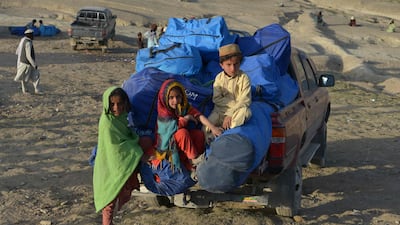Charity workers have condemned the UK government for not doing enough to help people in Afghanistan who are suffering amid a deepening humanitarian crisis.
Monday marked a year since the Taliban took control of the Afghan capital Kabul and the departure of western troops.
Many Afghans have since been pushed into desperate living conditions, with reports that some parents have been forced to feed their children grass to try to help them survive.
Christine Allen, executive director of the Catholic Agency for Overseas Development (Cafod), said that Afghanistan is an example of a “much broader malaise in terms of the UK government and its attitude to aid”.
She said there has been a “complete shrinking” of the aid package since 2019, despite twice as many people being in desperate need.
The UK doubled its aid to Afghanistan to £286 million ($345m) in August 2021 and matched that figure in 2022, but this came after the government broke a manifesto promise by cutting £4.5 billion from the aid budget.
In 2019, when western forces were still in Afghanistan, the UK was providing £292m.
Cafod said food scarcity is pushing families to extreme measures and they will soon face more hardship with winter “around the corner”.
“We’re talking minus 10, minus 15 degrees, so you’ve got people who haven’t been able to grow crops, we’ve seen crop failures because of the drought,” Ms Allen said.
“We’ve seen crop failures because people have not been able to harvest because of being displaced and because of other pressures and restrictions.”
Niamh Furey, Cafod’s programme officer for Afghanistan, said the charity has been working with families who have been “forced to feed their kids grass”.
One year since the Taliban seized power in Afghanistan — in pictures
Ms Furey also spoke about the cost-of-living crisis in the UK — with some people having to choose between heating and eating — and why more still needs to be done to help “starving” families in Afghanistan despite the hardships faced by many in the UK.
“I imagine that [for] some people … the reaction to providing aid to Afghan people will be ‘well, can we not provide aid closer to home?’ There are many people in need here in the UK,” she said.
“But when you hear stories about families feeding their children grass, I think it hits home how desperate the situation is.”
Ms Furey also noted a series of reports that families are having to “sell their young daughters” because they cannot feed their family.
“They’re really resorting to doing that,” she said.
“They obviously don’t want to have to sell their children, but unfortunately, within the current context, young girls are not being protected across the board.”
Cafod has worked in Afghanistan since 1980 and scaled up its work after the Taliban takeover, providing money to 47,767 people, emergency food to 40,254, and supporting women’s rights groups.
A representative for the British Foreign, Commonwealth and Development Office said: “The UK is taking a leading role in the humanitarian response to support the people of Afghanistan.
“We doubled our aid to Afghanistan to £286 million and have matched that again this year, making it our largest bilateral UK aid programme.”












































































